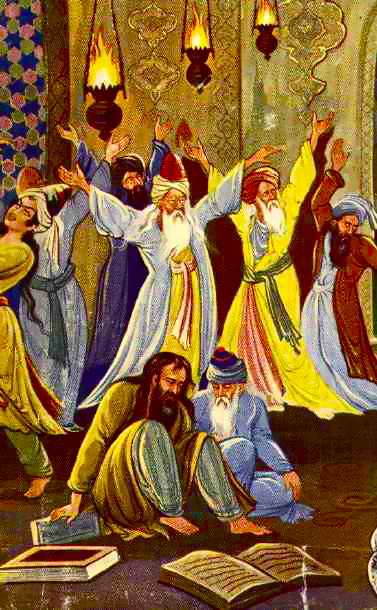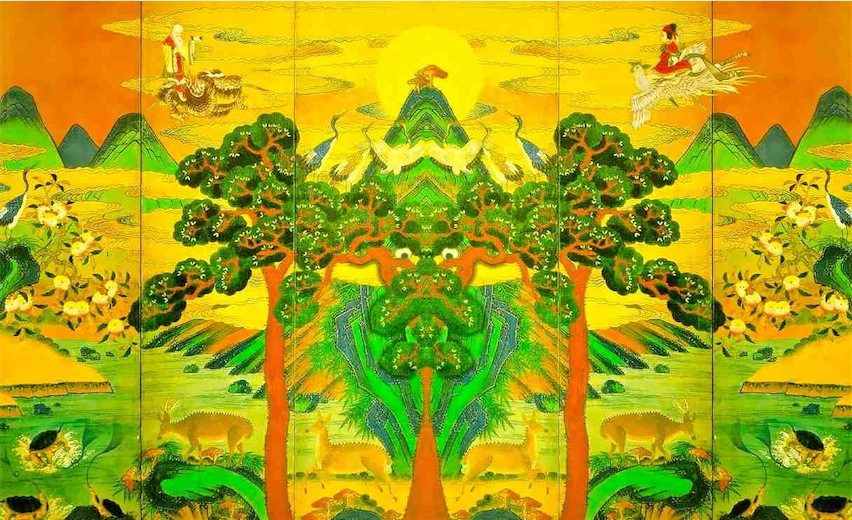| |
|
Tao means the 'Way'
Tao assumes that man is born into a world
he did not make and cannot understand!
Encumbered with duties and harassed by fears, man
only increases his misery by trying to achieve goals which are
beyond his reach.
The way to minimize suffering is thus to avoid ambition and take
life as it comes. |
|
Taoists Young and Old - Behold the
Spectacular Mountain Scenery
(This instills a 'Love of Nature' and 'Reverence for the Natural
Environment') |
|
At the time Lao Tzu envisioned Taoism,
it was considered a 'School Of Philosophy'
It was during the Eastern Han Dynasty that Taoism became a
recognized 'Religion' |
|
In its Popular Forms:
Taoism is represented by a "Pantheon of Gods and Demons"
And has absorbed almost every ancient practice known to the Chinese
people! |
|
"All difficult things have their origin
in that which is easy,
and great things in that which is small" - Lao Tzu |
|
Spirit and Body - are integral to each other, we
cannot have one without the other. Our Spirit is regarded as true, while
our body is regarded as false.
If we want to revert to the Tao, we need a medium to practice it, and
that medium is the body. Our Spirit needs to be in a pure and empty
state.
We can also conclude that all forms, intentions and things are false;
only formless, emptiness and natural flow of instincts that are free of
desire are true. Over more than 2,300 years of practice,
Taoists developed an anarchistic life style, avoiding state authority
and offering an escape from the demands of society and, sometimes, the
arm of the law.
Taoist Masters claimed 'Unusual Abilities' through practicing
secret techniques known only to the initiated.
Taoists embellished their earthly philosophy with a complex set of
beliefs and rituals that gave its practitioners apparently
'Supernatural Powers'.
Taoists evolved a "Mystical Skepticism'' about the world,
embracing techniques for meditation, herbal medicine, martial arts, and
the "Quest for Immortality". |
|
Wellness - Health and Body Care are
Primarily Taoist Domains
These practices in Chinese are called 'Yang Sheng'
Taoist Temples offer courses in herbs, general health, nutrition,
meditation, etc. |
1) In imperial Times - Taoist texts were used to justify peasant
rebellions, and the peasant rebels believed that Taoist magic made them
immune to Western bullets when they attacked the foreign missions in
Peking during the Boxer Rebellion at the turn of the 20th Century.
2) Huashan Taoists - Believed that enlightenment, spiritual liberation,
transcendence of reincarnation, and attainment of immortality were
possible only through purification of the body and mind through diet,
exercise, herbal regimens, Chi Gung and meditation. |
|
Similarities between Sufism in
Pakistan and Taoism in China |
| Father of Taoism - Lao Tzu, promoted passive behavior and
harmony within one’s own self and nature. Taoism is acceptance of life,
following one’s breath to find peace and practicing meditation for inner
peace and harmony. Tao is the path to embrace wonder of life and joy in
living. It is the acceptance of one’s own self, others and nature. It is
the path to enlightenment and the practice of trusting one’s own
intuitions. Therefore, to follow the Tao is to recognize the inner
harmony and balance in all living things and systems. |
 |
These distinct features of Taoism are in conformity with the beliefs
and practices of Sufi orders in Pakistan. Pakistan inherited a culture
of Sufism which always lived up to the principles of harmony, inner
peace and eternal love. Sufis embraced people irrespective of their
beliefs, norms and regions. All Sufi orders spread the message of
brotherhood and humanity.
Pakistani Sufi poet, Baba Bulhey Shah wrote extensively on avoiding
labels. He did away with labels and worked for humanity only. Meditation
has been a core practice in Sufi practices in one form or the other. A
great Sufi sage, Muhammad Azeem Barkhia’s spiritual teachings of
considering pleasure and pain as one and coming to the reality above all
rightdoing and wrongdoing resonates with Ying-Yang theory of Taoism.
A genre of music, Qwali, is sung in nearly all Sufi orders. It is
relatable to the chanting and instrumentations the Taoist priests use to
achieve Tao. Sultan Bhao laid special emphasis upon breathing which he
thought was the means to connecting to advanced forms of reality.
Sufism is based on universal values which transcend times and boundaries
and are durable.
Also, 'Sun Tzu' is taught at the universities of Pakistan.

|
|
 |
|